How Does Following an Interest Differ From a Theme? Understanding Emergent Curriculum
Following my posts, Following Children’s Interests and What Happens When You Follow a Child’s Interest?, I wanted to clarify the ways in which following a child’s (or group of children’s) interest differs from learning about a given ‘theme.’
I consider there are two major differences
- Who takes the lead, and
- How the content is formulated.
Who Takes the Lead?
Traditionally, with a thematic teaching approach, the educator (and I use the word ‘educator’ to indicate the adult the child is learning alongside, this may be a teacher in a formal environment or a parent in a home environment) decides upon the theme to be studied.
With an Emergent Curriculum approach, the educator shares the driving seat with the child and the child’s words, actions, thoughts and play guide the learning curriculum. So, given the child’s current fascination with and questions about a topic, the focus of the learning and choice of activities evolves. Of course, the educator will balance this with knowledge of what skills s/he would like the child to be acquiring or practising, you can learn to count whether you are counting garbage trucks or daffodils.
How the Content is Formulated
Within a thematic curriculum planning approach, the educator chooses a range of resources, books and activities they feel would be interesting for the child/ren to engage with. This approach is typically pre-planned and follows the sequence of activities determined by the educator.
Within an emergent curriculum, the educator considers;
- What the child/ren already knows about the interest,
- How to deepen the child’s level of understanding, finding answers to their questions,
- Appropriate creative and communicative mediums that will allow the child/ren to communicate their developing understanding,
- What questions to ask of the child and research with the child to extend the interest, and
- How to use the child/ren’s fascination to reinforce skill development (reading, writing, mathematical concepts, etc).
And they continue to revisit these questions as the investigation of the interest continues.
An example from the classroom;
A group of three-four year olds had been drawing and talking about rainbows repeatedly, sharing their experiences of where they had seen rainbows and what they looked like. Their educator asked, “When do you see rainbows?”
Child 1 responded, “Up in the sky.”
Child 2 responded, “After it rains.”
Child 3 then added, “Yeah, when its all wet.”
Child 2 then added, “Yeah but then the sun comes out and dries up all the rain and it goes up into the sky until it rains again” (demonstrating with his hands).
Child 3 then added, “And the rainbow gets stuck in the trees,” (laughing).
Child 4 then entered the conversation with, “It gets stuck above the trees.”The educator then asks, “But how does the rainbow get there?”
Child 5, “Someone puts it there.”
Child 1, “The rainbow guy makes them.”
The conversation continued with the children agreeing that they weren’t sure how rainbows were made; just that it had to be wet for them to get there.
This conversation provides the educator with lots of information about what the children know, or think they know, about rainbows and it provides a great starting point for the learning program.
- The educator may use the record of this conversation to plan further questions to get the children to express their ideas and understandings in more detail (thinking and reasoning and communicating skills).
- The educator can choose to encourage the children to represent what they ‘know’ creatively, maybe designing and then making “rainbow making machines” with sculpture materials like paper mache or box construction (thinking and reasoning, problem solving, 3D mathematical and creative skills).
- The educator could make a list of research questions with the children about what they would like to know about rainbows and then use the internet or a library visit to find the answers (thinking and reasoning and literacy skills).
This short example provides a snapshot of how an emergent curriculum approach is much more organic and based upon the child’s responses to the learning program, including learning from their misconceptions. The children will be developing lifelong learning skills in a manner that is fun, engaging and interesting to them.
Do you teach using interests or themes?
Read more of the Understanding Emergent Curriculum series;

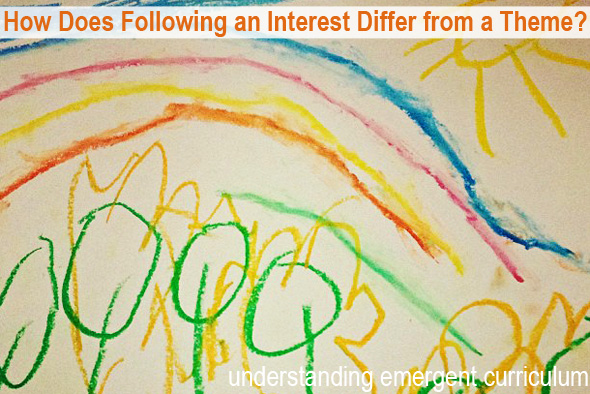
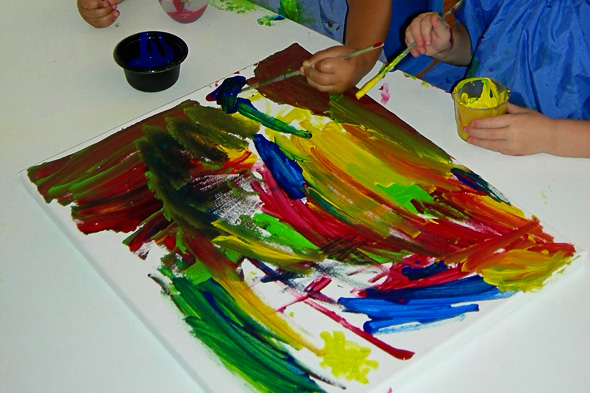


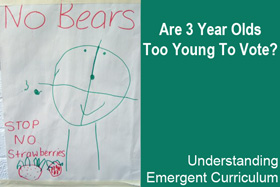
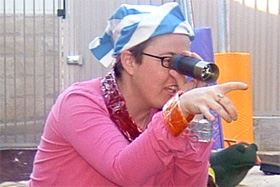

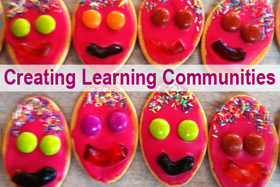
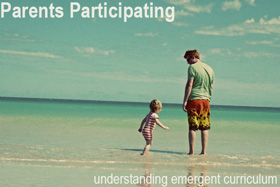
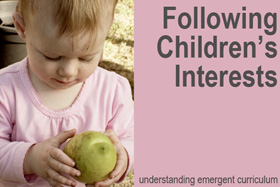
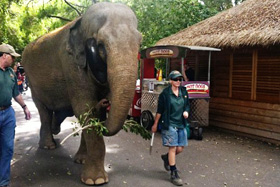
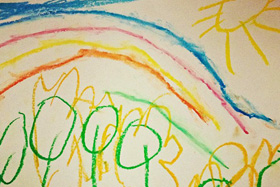


We discussed this is tutes the other week. Also a theme is something that you can pull out every year i.e. 'Spring' in the first week of September, even though the children aren't slightly interested and they are a different group of children.
I think its good to point out though that the Emergent Curriculum is planned. You would be surprised at how many early childhood educators think that because it is following the child's interest you don't have to plan just 'chuck out' resources and let them 'go nuts' or 'do what they want'. This is not the case, in order to follow the child's interest you need to have observations and plans detailing this.
I'm currently working on my report on pedagogical documentation and will implement a ped doc whilst on prac! So incredibly excited!
Thanks for your comment, be sure to have a look at the other Emergent Curriculum posts and I am sure you will see that I do advocate that the curriculum is planned.
Christie
I was fascinated to read your series about Emergent Curriculum and your experiences as a Director of an early childhood center. Your center sounds fantastic. We just moved our daughter from a preschool (in US) that was very ad-hoc to another one that is theme-based. To be honest, I am not sure that they really try to adapt their curriculum to the kids – after all, there are 20 kids to 3 teachers, but I am optimistic that between home experiences and school experiences, she will get some good idea of the world around her. I tend to plan some sort of theme for a week, but I am not bound by any sort of "must do" list. In this case I think I follow Emergent guidelines – I want to see what she is interested in and will spend more or less time on the subject depending on her degree of enthusiasm. Thanks for a very educational writing – your daughter is lucky to have mum with so much experience.
Right… the penny has now dropped!
I am very fortunate that the munchkin’s preschool teachers have been doing this exceptionally well. (OK, we’re paying a small fortunate for that privilege as well…) He’s a very bright, imaginative and active child, and they have been able to meet his needs while creating a fun, learning experience for the other children in his class.
However, he has had a bit of trouble with his pencil grip. He attended a few OT sessions to help correct this, and seems to be doing OK, but he rarely wants to draw! I often read your site with tears in my eyes, as I look at Immy’s beautiful creations. As a designer and art lover, I had so hoped that the munchkin would be producing similar creations by now (he’s 5). Up until about 5 minutes ago, I had been wondering how to “encourage” him to do more drawing and fine motor work at home, so he can practise and improve his skills. I now think I know how to deal with the problem.
Viking runes and warship designs, here we come! Thank you so much…
It sounds like you have a plan. Good luck x
I still don t understand How can you plan ahead if it is based on child interests I think I get the idea clear about taking note on the skills and themes you worked but do not get how to plan before playing with them and listening to them.Thank you.
Laura Oreamuno.
San Jose Costa Rica.
OK, for example on your post about Immy experimenting with sink and float in your garden It is easy to see the emergent interest,experimentation and how to inquire creatively so she goes on and on…but there was not any planning ahead in this . It feels like the kind of activity any good educator would let flow if appears, but how do I plan it.
Laura Oreamuno
San Jose. Costa Rica.
Thank you for your questions, Laura. In my experience, my planning changed form from everything being in the program being dictated by me (in terms of what the children learnt, how and when) to their interests driving the program. This did not mean I did not plan or program but it took a different form. I would brainstorm potential activities and ideas around an interest and the children’s questions and thoughts, but these activities tended to be more open ended so that instead of me giving the children all of the answers, I acted as a guide to help them find their own answers. I always had these ideas up my sleeve so when the children seemed to be heading in a particular direction with their thoughts I could use the activities as a response to that, or I could set up an activity that I thought they would enjoy (based on my observations of their interest) as an invitation to play/learn and see how they responded, which would then inform my further brainstorming and planning. In some ways my actual program became more of a retrospective record of what we had done, with the support of my brainstorming documents showing my preparation for learning.
I enjoyed reading your clear explanation of Emergent Curriculum, since it clears up a common misconception; that Emergent Curriculum is not planned! I would describe this approach as intentional. Everything we do in terms of supporting children’s interests, questions, and ideas, is intentional: The environment that provides loose parts with which to experiment, the invitations we as teachers provide for children, the documentation that we take back to the children so that they can revisit their ideas and think some more. I have practiced in this way for many years, and teach it through trainings to hundreds of others, and can reassure folks that this type of teaching and learning is a true collaboration between teacher and child, and that it enables children to learn how to learn, and love it! My books offer strategies and illustrate with stories how this all unfolds, and if you need a more complete picture of what emergent curriculum looks like in practice, there are some sample projects on my website – enjoy!!
Intentional is the perfect word. Thank you for your comment.